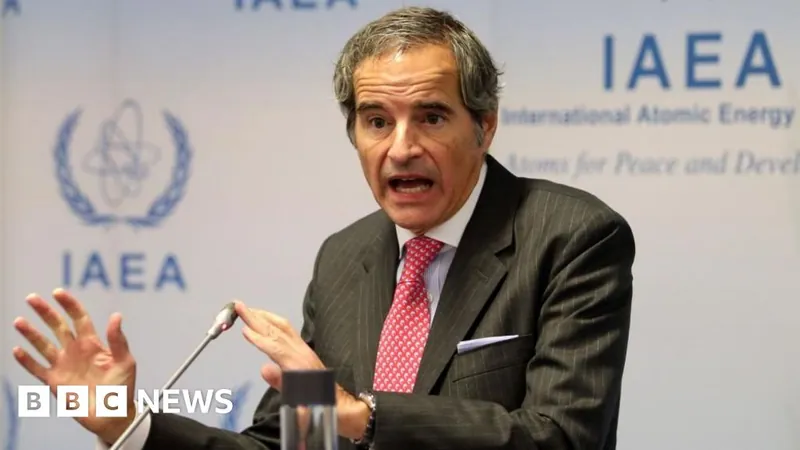
Rising Tensions: Iran's Uranium Enrichment Sparks Global Concerns
2024-12-06
Author: Jacques
Introduction
Iran's recent decision to significantly ramp up its uranium enrichment program has alarmed international authorities, particularly the head of the UN nuclear watchdog. Rafael Grossi, the director general of the International Atomic Energy Agency (IAEA), described the situation as "very worrisome" during a recent interview with the BBC.
Uranium Enrichment Escalation
The IAEA reports that Iran is increasing its stockpile of uranium enriched to 60% purity—just shy of the threshold necessary for developing a nuclear weapon. This escalation is widely interpreted as a reaction to Iran's military and diplomatic setbacks in regions such as Syria, Lebanon, and Gaza over the past few months.
Leadership's Approach
Grossi noted that while some Iranian politicians are vocal about pursuing a nuclear weapons program, the current leadership appears to be opting for a more restrained approach. Despite this, concerns remain palpable, especially after the IAEA confirmed that Iran is feeding larger amounts of partially enriched uranium into centrifuges at the Fordow nuclear facility, located south of Tehran. According to IAEA assessments, the facility is now projected to produce approximately 34 kg (75 lbs) of 60% enriched uranium each month—a staggering increase from previous levels.
Call for Safeguards
In an urgent call to action, Grossi emphasized the necessity for additional safeguards at the Fordow facility to ensure that uranium is not being enriched beyond declared levels and to prevent any diversion of nuclear materials. He characterized the transformation of Iran's nuclear program over the past decade as dramatic—asserting that the nation of 2015 is drastically different from the Iran of 2025.
Negotiations and Recent Developments
During his last visit to Tehran, Grossi claims Iranian leaders assured him they would limit the enrichment of uranium, yet recent developments reveal a marked increase in production, especially in light of stalled nuclear negotiations with European officials.
Potential Consequences of Conflict
Grossi further warned of the implications of a potential Israeli attack on Iranian nuclear sites, stating the consequences would be "very, very serious" and could lead to retaliation and the spread of radiation. Israelis have not yet launched full-scale attacks but have frequently discussed this possibility amidst rising tensions.
Global Nuclear Trends
The head of the IAEA also highlighted a troubling global trend where more countries express interest in acquiring nuclear capabilities, leading to the normalization of discourse surrounding their potential use. He noted, "There are countries saying: well, why not us?" This shifting narrative indicates a growing sense of insecurity that could destabilize global peace.
Conclusion
In summary, the situation surrounding Iran’s uranium enrichment is unfolding against a backdrop of international unease, age-old geopolitical rivalries, and the precarious balance of nuclear deterrence. The world watches closely as advocates for nuclear transparency call for renewed dialogue and cooperation to avert a crisis that could have catastrophic consequences.



 Brasil (PT)
Brasil (PT)
 Canada (EN)
Canada (EN)
 Chile (ES)
Chile (ES)
 Česko (CS)
Česko (CS)
 대한민국 (KO)
대한민국 (KO)
 España (ES)
España (ES)
 France (FR)
France (FR)
 Hong Kong (EN)
Hong Kong (EN)
 Italia (IT)
Italia (IT)
 日本 (JA)
日本 (JA)
 Magyarország (HU)
Magyarország (HU)
 Norge (NO)
Norge (NO)
 Polska (PL)
Polska (PL)
 Schweiz (DE)
Schweiz (DE)
 Singapore (EN)
Singapore (EN)
 Sverige (SV)
Sverige (SV)
 Suomi (FI)
Suomi (FI)
 Türkiye (TR)
Türkiye (TR)
 الإمارات العربية المتحدة (AR)
الإمارات العربية المتحدة (AR)